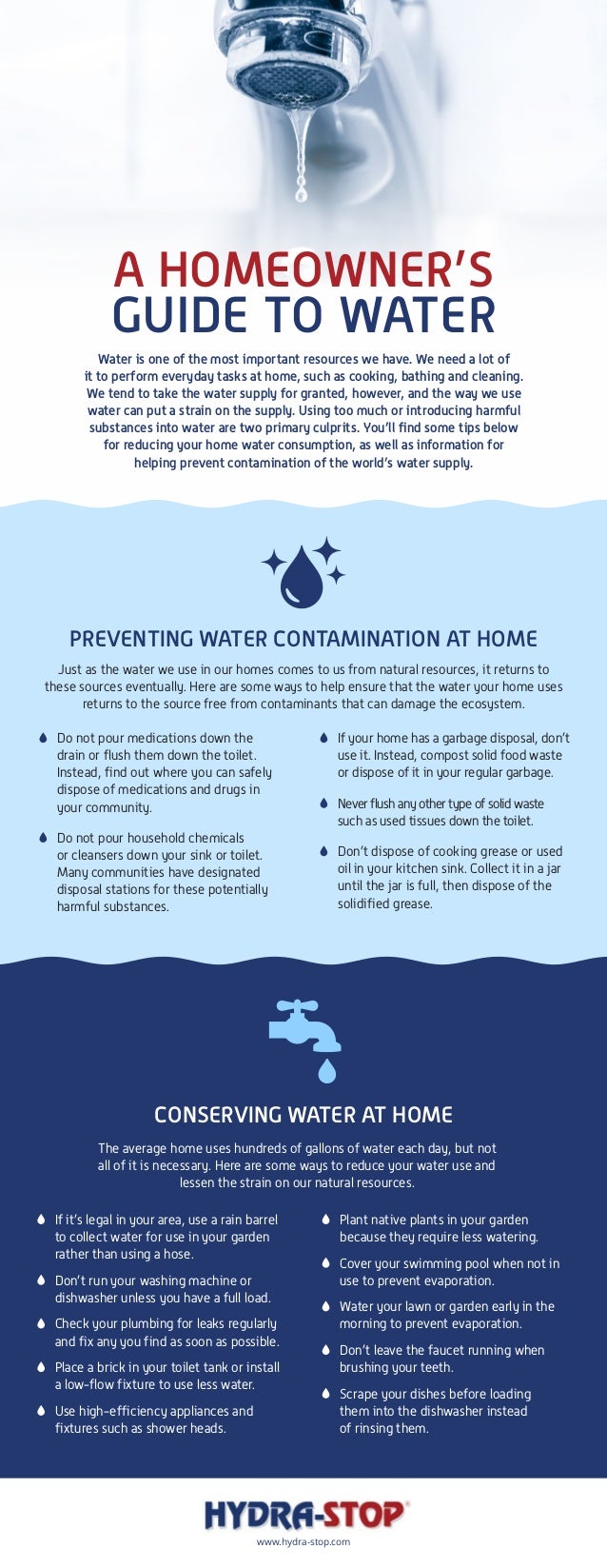Infographic created by Hydra-Stop
Water Usage
Water is one of the most important resources we have. We need a lot of it to perform everyday tasks at home, such as cooking, bathing and cleaning. We tend to take the water supply for granted, however, and the way we use water can put a strain on the supply. Using too much or introducing harmful substances into water are two primary culprits. You’ll find some tips below for reducing your home water consumption, as well as information for helping prevent contamination of the world’s water supply.
A HOMEOWNER’S GUIDE TO WATER PREVENTING WATER CONTAMINATION AT HOME
Just as the water we use in our homes comes to us from natural resources, it returns to these sources eventually. Here are some ways to help ensure that the water your home uses returns to the source free from contaminants that can damage the ecosystem. Do not pour medications down the drain or flush them down the toilet. Instead, find out where you can safely dispose of medications and drugs in your community.
Do not pour household chemicals or cleansers down your sink or toilet. Many communities have designated disposal stations for these potentially harmful substances. If your home has a garbage disposal, don’t use it. Instead, compost solid food waste or dispose of it in your regular garbage. Never flush any other type of solid waste such as used tissues down the toilet. Don’t dispose of cooking grease or used oil in your kitchen sink. Collect it in a jar until the jar is full, then dispose of the solidified grease.
CONSERVING WATER AT HOME
The average home uses hundreds of gallons of water each day, but not all of it is necessary. Here are some ways to reduce your water use and lessen the strain on our natural resources. If it’s legal in your area, use a rain barrel to collect water for use in your garden rather than using a hose. Don’t run your washing machine or dishwasher unless you have a full load. Check your plumbing for leaks regularly and fix any you find as soon as possible. Place a brick in your toilet tank or install a low-flow fixture to use less water. Use high-efficiency appliances and fixtures such as shower heads. Plant native plants in your garden because they require less watering.
Cover your swimming pool when not in use to prevent evaporation. Water your lawn or garden early in the morning to prevent evaporation. Don’t leave the faucet running when brushing your teeth. Scrape your dishes before loading them into the dishwasher instead of rinsing them.
 WhosGreenOnline.com Your Online Magazine and Directory for Green Business, Product, Service and News!
WhosGreenOnline.com Your Online Magazine and Directory for Green Business, Product, Service and News!


